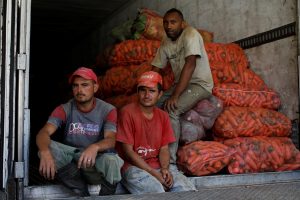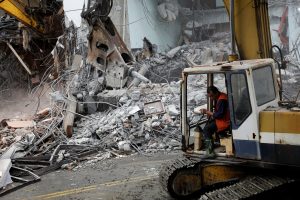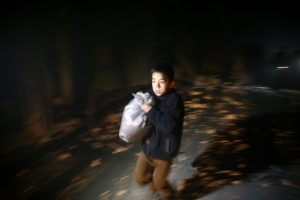
By Andrew Cawthorne
LA GRITA, Venezuela (Reuters) – It’s midnight on one of the most dangerous roads in Latin America and Venezuelan trucker Humberto Aguilar hurtles through the darkness with 20 tons of vegetables freshly harvested from the Andes for sale in the capital Caracas.
When he set off at sunset from the town of La Grita in western Venezuela on his 900-km (560-mile) journey, Aguilar knew he was taking his life in his hands.
With hunger widespread amid a fifth year of painful economic implosion under President Nicolas Maduro, Venezuela has seen a frightening surge in attacks on increasingly lawless roads.
Just a few days earlier, Aguilar said he sat terrified when hundreds of looters swarmed a stationary convoy, overwhelming drivers by sheer numbers. They carted off milk, rice and sugar from other trucks but left his less-prized vegetables alone.
“Every time I say goodbye to my family, I entrust myself to God and the Virgin,” said the 36-year-old trucker.

Workers pose for a picture while they load vegetables into a truck to sell them in the town of Guatire outside Caracas, in La Grita, Venezuela January 27, 2018. REUTERS/Carlos Garcia Rawlins
While truck heists have long been common in Latin America’s major economies from Mexico to Brazil, looting of cargoes on roads has soared in Venezuela in recent times and appears to be not just a result of common crime but directly linked to growing hunger and desperation among the population of 30 million.
Across Venezuela, there were some 162 lootings in January, including 42 robberies of trucks, according to the consultancy Oswaldo Ramirez Consultores (ORC), which tracks road safety for companies. That compared to eight lootings, including one truck robbery, in the same month of last year.
“The hunger and despair are far worse than people realize, what we are seeing on the roads is just another manifestation of that. We’ve also been seeing people stealing and butchering animals in fields, attacking shops and blocking roads to protest their lack of food. It’s become extremely serious,” said ORC director Oswaldo Ramirez.
Eight people have died in the lootings in January of this year, according to a Reuters tally.
The dystopian attacks in a country with one of the world’s highest murder rates are pushing up transport and food costs in an already hyperinflationary environment, as well as stifling movement of goods in the crisis-hit OPEC nation.
They have complicated the perilous life of truckers who already face harassment from bribe-seeking soldiers, spiraling prices for parts and hours-long lines for fuel.
Government officials and representatives of the security forces did not respond to requests for comment for this story.
Barred by law from carrying guns, the Andean truckers form convoys to protect themselves, text each other about trouble spots – and keep moving as fast as possible.
Aguilar said that on one trip a man appeared on his truck’s sideboard and put a pistol to his head – but his co-driver swerved hard to shake the assailant off.
On this journey, however, he was lucky. Just before reaching Caracas, assailants hurled a stone at his windscreen but it bounced off.
Even once Andean truckers reach cities, there is no respite.
Armed gangs often charge them for safe passage and permission to set up markets.
“The government gives us no security. It’s madness. People have got used to the easy life of robbing,” said Javier Escalante, who owns two trucks that take vegetables from La Grita to the town of Guatire outside Caracas every week.
“But if we stop, how do we earn a living for our families? How do Venezuelans eat? And how do the peasant farmers sell their produce? We have no choice but to keep going.”
GUNMEN ON BIKES
The looters use a variety of techniques, depending on the terrain and the target, according to truckers, inhabitants of towns on highways, and videos of incidents.
Sometimes gunmen on motorbikes surround a truck, slowing it down before pouncing like lions stalking prey. In other instances, attackers wait for a vehicle to slow down – at a pothole for example – before jumping on, cutting through the tarpaulin and hurling goods onto the ground for waiting companions.
In one video apparently showing a looting and uploaded to social media, people are seen gleefully dragging live chickens from a stranded truck.
The looters use tree trunks and rocks to stop vehicles, and are particularly fond of “miguelitos” – pieces of metal with long spikes – to burst tires and halt vehicles.
A ring-road round the central town of Barquisimeto, with shanty-towns next to it, is notorious among truckers, who nickname it “The Guillotine” due to the regular attacks.
In some cases, crowds simply swarm at trucks when they stop for a break or repairs. Soldiers or policemen seldom help, according to interviews with two dozen drivers.
Yone Escalante, 43, who also takes vegetables from the Andes on a 2,800-km (1,700-mile) round-trip to eastern Venezuela, shudders when he recalls how a vehicle of his was ransacked in the remote plains of Guarico state last year.
The trouble began when one of his two trucks broke down and about 60 people appeared from the shadows and surrounded it.
Escalante, about half an hour behind in his truck, rushed to help. By the time he arrived, the crowd had swelled to 300 and Escalante – a well-spoken businessman who owns trucks and sells produce – said he jumped on the vehicle to reason with them.
“Suddenly two military men arrived on the scene, and I thought ‘Thank God, help has arrived’,” Escalante recounted during a break between trips in La Grita.
But as the crowd chanted menacingly “Food for the people!”, the soldiers muttered something about the goods being insured – which they were not – and drove off, he said.
“That was the trigger. They came at us like ants and stripped us of everything: potatoes, onions, tomatoes, cucumber, carrots. It took me all day to load that truck, and 30 minutes for them to empty it. I could cry with rage.”
MAD MAX OR ROBIN HOOD?
Though events on Venezuela’s roads may seem like something out of the Mad Max movie, truckers say they are often more akin to Robin Hood as assailants are careful not to harm the drivers or their vehicles provided they do not resist.
“The best protection is to be submissive, hand things over,” said Roberto Maldonado, who handles paperwork for truckers in La Grita. “When people are hungry, they are dangerous.”
However, all the truckers interviewed by Reuters said they knew of someone murdered on the roads – mainly during targeted robberies rather than spontaneous lootings.
With new tires now going for about 70 million bolivars – about $300 on the black market or more than two decades of work at the official minimum wage – looters often swipe them along with food.
The journey from the Andes to Caracas passes about 25 checkpoints, where the truckers have to alight and seek a stamp from National Guard soldiers.
At some, a bribe is required, with a bag of potatoes now more effective than increasingly worthless cash.
Yone Escalante said that on one occasion when he was looted after a tire burst, policemen joined in the fray, taking bananas and cheese with the crowd.
In the latest attack, just days ago, he was traveling slowly over potholes in a convoy with four other trucks after dark, when assailants jumped on and started grabbing produce.
“Even though there were holes in the road, we sped up and swerved to shake them off,” he said. “It’s either us or them.”
(See http://reut.rs/2GVaX0s for a related photo essay and http://tmsnrt.rs/2sgqfJP for a map of one trucking route)
(Additional reporting by Leon Wietfeld in Caracas and Anggy Polanco in La Grita; Editing by Girish Gupta, Daniel Flynn and Frances Kerry)













